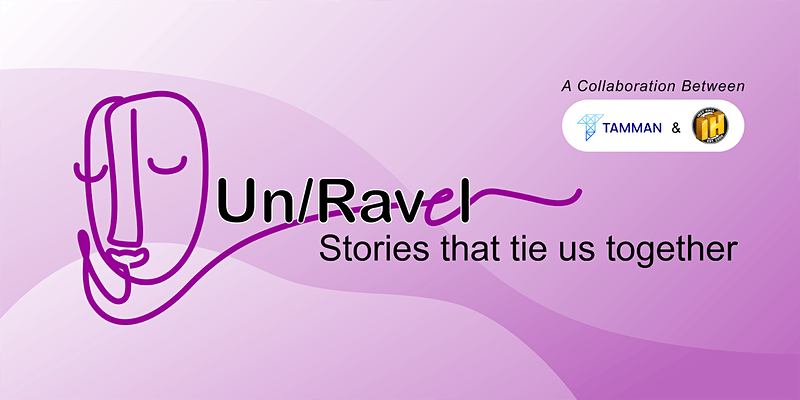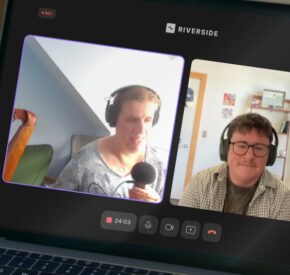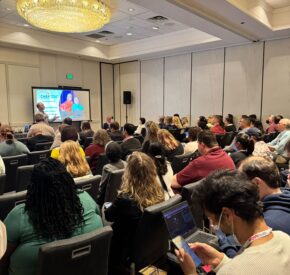Un/Ravel – Stories That Tie Us Together
Article 19 fosters conversations centering dignity and human connection

Tamman and Indy Hall partnered to launch Un/Ravel, a series of short talks exploring accessibility, work, and community. The inaugural event, held on Global Accessibility Awareness Day, aimed to foster empathy and connection by sharing diverse perspectives on inclusion, health, and work. By understanding each other’s experiences, we can create more equitable and inclusive spaces.
Meet our guests:
- Adam Teterus is the Director of Community at Indy Hall, the nation’s longest-running coworking space. He empowers other coworking businesses by sharing his expertise in sustainable growth and community development.
- Alexandra Hunt is a public health researcher and social justice advocate. She’s passionate about health equity and empowering communities, especially those facing disabilities. Her personal experiences drive her to break down systemic barriers and create a more inclusive world.
- Shannon Devido is an actress, comedian, singer, and writer. Known for her work in TV and film, Shannon uses her platform to challenge societal stereotypes about disability and advocate for dignity and inclusion.
- Terrill Haigler is a community activist and CEO of YaFavTrashman, LLC. As an essential worker, he advocated for sanitation workers during the pandemic and continues to improve his community through cleanups and his nonprofit.
Listen to more Article 19 Podcast Episodes
Full Transcript
Access PDF Transcript
Voiceover:
Expression is one of the most powerful tools we have. A voice, a pen, a keyboard.
The real change which must give to people throughout the world their human rights must come about in the hearts of people. We must want our fellow human beings to have rights and freedoms, which give them dignity.
ARTICLE 19 is the voice in the room.
Marty Malloy:
Hello, ARTICLE 19 listeners. My name is Marty Malloy, and today’s podcast is a real treat. On May 19th of this year, Tamman, with our partners and friends at Indy Hall in Philadelphia, produced an event called Un/Ravel: Stories that tie us together. Un/Ravel is meant to be a series of personal and human-centered stories that tie all of us together. This was our inaugural event, and it was a day that would lift up inclusion with the theme, dignity. All of our speakers that you’re going to hear were focused on the subject, dignity. I’m gonna be turning this over to the host for that evening, Adam Teterus. Adam is a community leader, a podcaster in his own right, a director, an activist, an actor, but most of all, Adam builds community, and this is what he does at Indy Hall and everywhere he goes. I feel so fortunate to have had him as a partner for Un/Ravel, this Un/Ravel, and certainly, future Un/Ravels to come. Without further ado, I hope you enjoy this audio presentation of Un/Ravel: Stories that tie us together.
Adam Teterus:
For our very first edition of Un/Ravel, we wanted to choose a subject that I think is present in everyone’s life, I know is present in everyone’s life, but maybe is a concept that is taken for granted, even as important as it is. We chose dignity. But what is dignity? Dignity is a lot of different things. It comes in a lot of different packages. You know when you are being awarded dignity, and you definitely know when it’s absent. In line with the notion for Un/Ravel, this goal of bringing disparate people from different backgrounds, different cultures, and fields of work, experiences, we know that our three speakers today all have their own unique experiences and struggles when it comes to dignity. Now, we’re talking about three people who are only just meeting each other for the very first time, and finding, regardless of the fact that they do totally different things with their lives, and they come from completely different backgrounds, this struggle to be given the respect that they deserve is one that unifies them, and I think you’ll find that that is true as we begin our lineup today with our first speaker. Our first speaker is Alexandra Hunt. She is a public health researcher, a girls soccer coach, an advocate for social, racial, economic, and environmental justice, and an organizer fighting for the 3rd District of Pennsylvania. She is a daughter of two teachers and a sister to a twin brother, and Alexandra’s twin brother grew up with a learning disability, so she’s quite familiar of what it’s like to struggle for dignity. Seeing the systemic obstacles that her brother faced inspired her to become an advocate and challenge barriers on the basis of race, gender, class, and neurodiversity. Without further ado, I’d like to welcome Alexandra Hunt.
Alexandra Hunt:
The theme is dignity, and from a young age, I was taught that you treat others the way you want to treated. Treating others with dignity became something that I believed was unconditional, and that has always been an energy that I’ve put forward to others, regardless of their background, their ability, their race, their gender, their age, and that they’re deserving and worthy of dignity. That’s been especially important as I’ve worked with people who are unhoused or food insecure, where there’s stigma associated with those sort of aspects, and also, whatever job you may work. That’s always been something that’s been very important to me, is to treat others the way I want to be treated, which is with dignity. I’m running for Congress in PA-3, which is most of Philadelphia. I have a background in public health, and I specialize in prevention. Going back further than that, I was raised by two teachers, and in that regard, I saw how a lot of people can look down on people who spend their lives educating the next generation, and don’t make a very attractive salary, but it’s enough to get by for sure. I have a twin brother who is on the spectrum, and seeing how people treated someone like him, who is just different, there’s nothing wrong with him, but just different, so poorly was horrifying to see, and it has definitely caused me to lead with an open heart towards other that people just don’t deserve the harshness of this world. When I was in college, I worked as a stripper, I worked as a server, and I worked at Victoria’s Secret as a sales associate. All of those jobs have been considered derogatory or demeaning for different reasons, one I’m in service to another, another one, I’m taking my clothes off for money. All of it is to make an honest living, and to pay my bills. That was the reason I did it, but people can simply choose to pay their bills, or to work a certain job if that’s what they so please. I think that’s the power of making a choice. Now, as I’m running this race for Congress, this past quarter, we outraised my opponent. My opponent has held public office for 42 years. He’s deeply entrenched, and for us to outraise him in a quarter is a very big deal. On the other hand, in response to some trolling attacks on social media, I made an OnlyFans, and I’m also very well known as the stripper candidate, the former stripper Congressional candidate, and I don’t have a name. It’s very hard to get people to report on our success in fundraising when they don’t want to take someone with my past and present seriously, and I think that that is where dignity comes to play, or lack of dignity comes into play. Throughout the media, I’ve been labeled as the former stripper, and have had my name, my identity, my story erased, and I think that, again, going back to, treat others the way you want to be treated, that this is dehumanizing, and that the media can play a powerful role in telling the stories of everyday people, and making sure that our individualism is valued while we bond in a communal sense through something like this.
Yeah, really thought-provoking, and inspiring talk from Alexandra Hunt. We were so lucky to have her with us. She has such an incredibly busy schedule. She was running for the 3rd District. Unfortunately, she was not ultimately elected, but the thing is, about an activist and about a politician and a woman like her, who cares so deeply about her neighbors and her city, that won’t stop her from continuing to be involved in local politics. You can follow Alexandra online. I encourage that you do so. If I may say so candidly, now that she is not under the magnifying glass while running to be elected, she’s got things to say. She has very important, bold things to say, and we are all so much better for her candor and her experience. Now, I want to take it to our next speaker in the lineup. Again, remember, that what Un/Ravel seeks to do is find that common thread between disparate people, different experiences, and identities, and we’re talking about dignity here. We’re going to hear from our next speaker, a very good friend of mine from long, long ago, Shannon DeVido. She is a BAFTA breakthrough actress and a comedian. She is so funny. She is best known for her work on TV in Bridesman, Difficult People, Insatiable, Delco Proper, Manifest, and even Law and Order: SVU. She is also the lead in a South by Southwest award-winning film. It’s called Best Summer Ever, and her YouTube channel, Stare at Shannon, has amassed over one million views, and has focused on dismantling the societal stereotypes of people with disabilities. A wheelchair user herself, she has a lot of to say on the subject of dignity. Please take it away, Shannon DeVido.
Shannon DeVido:
I’ve been thinking a lot about dignity and coming into this presentation, and I found a realization that as a person with a disability, I was born with spinal muscular atrophy. I’ve been in a wheelchair my whole life. I wouldn’t really consider my life lived especially with dignity. I’m not saying this so that you feel bad for me, but more that you understand that I was born into a society that is not set up for people with disabilities, and quite honestly, is set up for us to fail. We have to beg for services that allow us to live. We have to beg for accessibility, even though we’re supposed to be protected by law. We have to beg politicians to see us. We have to beg doctors to believe us. We have to beg for inclusion. It doesn’t really seem super dignified. Why, in 2022, are we still yelling into a void for people to see us? Well, I really attribute that to media representation. So much of how we learn about the world is through what we consume, and I always say that I never saw anyone that looked like me on TV until I was on TV. When disabled people were seen in TV or film, they always lacked agency, or were sad, or lived their life just to be cured. The story I always tell people that highlights that kind of mindset the most is, I was in Tennessee eating lunch in a food court, which, OK, granted, it was kind of sad, but I was eating my chicken nuggets when a woman came up to me and said, I’m sorry that your life is terrible now, but don’t worry, soon you’ll be dead, and then, you’ll be sitting at the right hand of God. There’s a few problems with that. One, not sure what you heard, but I am a terrible person, and my life is not very bad. I’m currently eating chicken nuggets. And two, if a woman, me, who curses regularly and spends most of her days eating chicken nuggets and watching reruns of The Office, if I’m going to be sitting at the right hand of God, Mother Teresa is going to be really pissed off. But because of stories like this, and because I get prayed for all the time, I grew up thinking that a person with a disability was a curse. But I’m not. I’m still kind of undoing that internalized ableism that I grew up with. In my work as an actor and a writer and creator, I do my best to represent the true disabled experience, people just living their lives and having relationships and loving and hating their jobs and finding the best snacks, because the only way to really live and understand living with a dignified life is to represent an inclusive society.
Adam Teterus:
Thank you so much, Shannon, for spending time with us, for that darkly hilarious story about some of her experiences, being approached by folks who have no earthly idea about her experience, and sharing a moral judgment upon her, and yet, she’s capable of so deftly navigating that without meanness, without darkness. Shannon has such a gift for finding levity in some of the toughest times, and I know that I’ve learned a lot from her, and fortunately, she’s funny as hell, so that really helps color the experience along the way. It’s not just tough education. She keeps you laughing. Thank you so much, Shannon. We have one final presenter, and again, in keeping with the theme, an entirely different type of work, and a very important one. Also keeping with the theme about dignity being a concept that I do believe we take for granted, as important as it is, our next speaker does a job that we all certainly take for granted, and I can’t think of many things more important than what he does. Terrill Haigler, also known as Ya Fav Trashman, is our next speaker, and less than three months after accepting a position as a laborer for the Philadelphia sanitation department, Terrill became an essential worker during the quarantine. That was a really important phrase. Now, to bridge the gap between residents and sanitation workers such as himself, he created the Instagram page, @yafavtrashman, to give residents an inside look as to what sanitation workers’ experience was during the pandemic. When Terrill noticed that his coworkers didn’t have the proper PPE to execute their job safely, he decided to stand in the gap and start a fundraiser to purchase that PPE, and hand sanitizer, and cleaning supplies to care for his peers, his coworkers. Now, he’s a community organizer and an activist, and Terrill spends his time organizing neighborhood cleanups, and running his nonprofit, Trash 2 Treasure Inc. That is not all he has on the horizon, as we’re about to find out. Take it away, Terrill.
Terrill Haigler:
My name’s Terrill Haigler, but a lot of people know me as yafavtrashman on Instagram, and when I think about what dignity means to me, is the pure fact that, as a sanitation worker, there was no dignity, there was no grace, there was no understanding, and to do sanitation work in the height of the pandemic added a extra layer to my job and to the job of my coworkers. When I think about how I interpretate dignity, and what I do now as a community organizer, a social media influencer, a dad, there’s a few things that come to mind. One is that I, as a sanitation worker, had to ask for dignity. In the middle of the pandemic, while on the route, picking up trash in Philadelphia, I actually had a resident pull a gun out on me because I wouldn’t take something, and to me, for you to be able to feel comfortable enough to pull a gun out on me because I won’t take your Styrofoam, because Styrofoam is not recyclable, and this is the recyclable truck, and that’s the rules my boss told me, just says you had a lack of dignity, and you had a lack of understanding, and you had a lack of grace during a time where people thought that sanitation workers weren’t going through the same thing. If your trash wasn’t getting picked up, my trash wasn’t getting picked up. It doesn’t matter that I work for the Streets Department. No one’s trash was getting picked up. For them to feel comfortable enough to pull a gun out is just, for me, why I needed to start my Instagram to actually show people what it was like to be a sanitation worker, and my grandmother always told me that in certain situations, you have to teach people how to treat you. I wanted to use my Instagram to teach people how to treat sanitation workers. Another story is that I started sanitation 2019, December 30, 2019. The pandemic hit March 2020. My first post was June 17, 2020, and by September 2020, I was on the Kelly Clarkson show. I didn’t have a lot of time in between starting the Instagram, and arising to what people call going viral, and fame. I didn’t have a lot of time to really understand what I was actually doing. Throughout this process, I’ve been learning what dignity looks like for my brand, for my company. I had a huge event October 10, 2020, but sadly, that morning, my mother actually had a heart attack, and I was sitting in the hospital. She was laying in her room in a coma, and something said that, just go do the event anyway. You can’t do nothing here. What’s going to happen is going to happen, so I went and did the event, and we fed 1,500 essential workers that day. Sadly, my mother passed November 1, but literally, the last thing she said to me was to use Ya Fav Trashman to change the world. Allow the generations after you to solve a different problem. Fix problems that we, as a people, have been passing down generation to generation, and part of that is trash. Philadelphia has been voted the dirtiest city in America, and for Philadelphia to have dignity, we have to clean ourselves up. It brings me joy, and it brings me pride to be an advocate for a cleaner Philadelphia, to be a advocate for sanitation workers, to be a advocate on teaching children about environmental justice in kindergarten. As Ya Fav Trashman, dignity doesn’t only mean as a person, but it means, as an industry, dignity to sanitation, as an environmentalist, dignity to Mother Earth, and then, as ourselves, just dignity, treating other human beings like human beings should be treated. That’s Ya Fav Trashman’s take on dignity, and I feel like, even though we all have different things going on with us, we all have a common issue, or a common problem that we can all just help each other with and solve it together. I say all the time, it’s going to take all of us to change the world. No one person can change the world by themselves. It’s definitely going to take all of us. But if we have dignity with each other, it’ll definitely be easier.
Adam Teterus:
Thank you so much, Terrill Haigler, my fav trash man. It’s really opened my eyes to the experience of our municipal workers, our sanitation workers. In normal times, such a different, herculean task in the city, and in the past few years, only more difficult, and more necessary for us regular folks, folks listening to this right now to have an understanding and an empathy, a connection to the people who are doing that all-important work. Thank you, Terrill. You can continue following Terrill. He’s always in the spotlight for something. He has an event coming up that you can be a part of, whether that is cleaning the block, or a fundraiser, or a block party, or he’s on TV. My man is showing up on daytime television fairly frequently, and we love him for that. You can follow him, again, at _yafavtrashman. Do so on Instagram. That is probably the best way to stay in touch. It is such a privilege to be in this event, to be a collaborator, a co-conspirator, and the host of today’s event, the very first Un/Ravel, and the first of many to come, I’m sure. Again, I just wanted to reiterate, the goal for this event is to help folks introduce themselves to one another. Our speakers got to meet one another and find connective tissue that binds their experiences, and hopefully, creates friendships, relationships that will last long beyond today’s events, and this podcast, and this recording. We don’t want that only for our speakers. Of course, we hope you, the listener, have a little bit of that experience, too, that you follow each of our three speakers, that you follow Tamman, that put this on, that you follow my organization, my community, Indy Hall, who was so fortunate to team up with Tamman to make this event a reality, because the best possible outcome from Un/Ravel is to find that connective thread, and to pull us all a little tighter to one another, and that’s what we’re going to continue doing with more speakers, and more themes, and more events in the future. Speaking of communities pulling together, I am the director of community for Indy Hall, Philadelphia’s longest running coworking community. We are a community of people who have a sense of independence. We do very different things from one another, but we all have this sense that we would rather work together than be apart, regardless of what it is that you work on, or where, or how, or when. We have a clubhouse in Northern Liberties in Philadelphia. We’re so thrilled to be back, and you can visit us. You can check us out online. We have a thriving online community that we have been growing since the beginning of our days in 2006, and it’s only been more important over the past few years from March of 2020 onward. You can check us out, whether that’s for the online community experience, or the in-person clubhouse experience. Either way, find us at indyhall.org. You see a lot of videos of me, yours truly, the host for today’s Un/Ravel. Thank you all so much for listening. We so hope we will see you and hear from you again in the future at our next Un/Ravel.
Marty Malloy:
I just feel so fortunate to work with Adam and all of our friends at Indy Hall. Everything that he brings, if you couldn’t hear it through this whole podcast today, is just incredible. Thank you, Adam, for hosting our first Un/Ravel, and I’m excited to work with you moving forward. For our listeners, I hope you enjoyed this audio presentation of this event, Un/Ravel: Stories that tie us together. Pulling on a thread that we heard from our speakers, our next topic for the next Un/Ravel is going to be around neurodiversity, and that’ll be in person, as well as online, in the fall of 2022, so be on the lookout for that. If you like what you heard, there’s a lot more to come, and maybe a few surprises thrown in. If you can join, great. If you want to be online, great. But if you just want to wait for the podcast version afterwards, that’s fine, too. We’re happy to have you in any way that you come. We’re also hard at work planning and beginning to record Season 2 of ARTICLE 19. I feel like we’ve been doing a lot of these individual, one-off recordings, but trust me, it’s coming, and we’ll be taking a deep dive into the Americans with Disabilities Act, how we got where we are now, where we might be headed, how digital accessibility plays into all of it. But in the meantime, we may have one, or two, or three more bonus episodes coming out in the meantime, so keep checking the podcast feed here, and if you like what you’ve heard today, and you want to explore more about digital accessibility, inclusivity, or to schedule a time to talk with us, you can find the whole Tamman team at tammaninc.com. That’s T-A-M-M I-N-C dot C-O-M, or you can follow us on all of our social media at Tamman Inc., that’s LinkedIn, Twitter, Instagram, or Facebook. We look forward to talking and listening to you next time.




